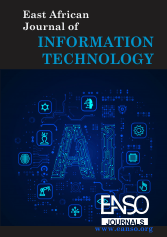Teacher Training Programs and the Effective Use of ICT in Education: Evidence from Public School Teachers in Rwanda
Abstract
This study investigates the relationship between teacher training programs and the effective integration of Information and Communication Technology (ICT) in public schools in Rwanda. A structured questionnaire was administered to 166 teachers, of whom 54% were male and 46% female. The majority were aged 31-40 years (39%), with 35% having 5-10 years of teaching experience. In terms of education, most held a bachelor’s degree (58%), followed by diploma holders (24%) and master’s degree holders (15%). Results show that 74% of teachers regularly use ICT tools in their teaching, and 85% believe ICT improves student engagement. Only 48% felt their training was adequate, while 72% cited poor internet connectivity and 69% cited lack of equipment as significant barriers. Descriptive statistics revealed that the mean ICT usage score was 3.8 (SD = 0.9), while perceptions of ICT impact had a mean of 4.2 (SD = 0.7). Regression analysis revealed that teacher training positively predicted ICT usage (β = 0.57, p < 0.001), whereas perceived barriers negatively predicted usage (β =-0.43, p < 0.001). The study concludes that systematic, pedagogically focused training, coupled with improved infrastructure and ongoing support, is essential for strengthening ICT integration in Rwanda’s education system
Downloads
References
Aesaert, K., & van Braak, J. (2015). ICT in education in Africa: Teachers’ perspectives. Computers & Education, 81, 63–75. https://doi.org/10.1016/j.compedu.2014.09.010
Creswell, J. W., & Creswell, J. D. (2018). Research design: Qualitative, quantitative, and mixed methods approach (5th ed.). Sage.
Davis, F. D. (1989). Perceived usefulness, perceived ease of use, and user acceptance of information technology. MIS Quarterly, 13(3), 319– 340. https://doi.org/10.2307/249008
Ertmer, P. A., & Ottenbreit-Leftwich, A. T. (2010). Teacher technology change: How knowledge, confidence, beliefs, and culture intersect. Journal of Research on Technology in Education, 42(3), 255– 284. https://doi.org/10.1080/15391523.2010.10782551
Gudmundsdottir, G. B., & Hatlevik, O. E. (2018). Factors influencing teachers’ digital competence. Computers & Education, 122, 50– 61. https://doi.org/10.1016/j.compedu.2018.02.009
Hew, K. F., & Brush, T. (2007). Integrating technology into K–12 teaching and learning: Current knowledge gaps and recommendations. Educational Technology Research and Development, 55(3), 223–252. https://doi.org/10.1007/s11423-006-9022-5
Karsenti, T., & Foko, T. (2010). Mobile phones in teaching and learning: Uses, benefits, and challenges. African Journal of Education and Technology, 6(1), 23–40.
Law, N., & Chow, A. (2008). ICT in education: Connecting policy and practice in Hong Kong. Computers & Education, 51(1), 120–136. https://doi.org/10.1016/j.compedu.2007.04.002
MINEDUC. (2019). Education Sector Strategic Plan 2018/19–2023/24. Ministry of Education, Rwanda.
Mishra, P., & Koehler, M. J. (2006). Technological pedagogical content knowledge: A framework for teacher knowledge. Teachers College Record, 108(6), 1017–1054. https://doi.org/10.1111/j.1467-9620.2006.00684.x
Mukama, E., & Andersson, S. B. (2008). Coping with change in ICT-based learning environments: Newly qualified Rwandan teachers’ reflections. Journal of Computer Assisted Learning, 24(2), 156–166. https://doi.org/10.1111/j.1365-2729.2007.00262.x
Ngaboyeka, A. (2020). Teacher preparedness and ICT integration in Rwandan secondary schools. African Journal of Education and Technology, 10(1), 45–56.
Nyaigotti-Chacha, C. (2007). ICTs in African education: Challenges and perspectives. African Journal of Education, 12(1), 33–47.
Teo, T. (2011). Factors influencing teachers’ intention to use technology: Model development and test. Computers & Education, 57(4), 2432– 2440. https://doi.org/10.1016/j.compedu.2011.06.008
Tondeur, J., Aesaert, K., Pynoo, B., van Braak, J., Fraeyman, N., & Erstad, O. (2017). Developing a validated instrument to measure preservice teachers’ ICT competencies: Meeting the demands of the 21st century. British Journal of Educational Technology, 48(2), 462–472. https://doi.org/10.1111/bjet.12442
Twinomugisha, A. (2017). Evaluating ICT teacher training programs in Rwanda: A longitudinal study. International Journal of ICT in Education, 14(3), 233–248.
Unwin, T. (2005). ICT4D: Information and communication technology for development. Cambridge University Press.
UNESCO. (2011). ICT competency framework for teachers. UNESCO.
Copyright (c) 2025 Daniel Mulindwa, Aggrey Ankwatse

This work is licensed under a Creative Commons Attribution 4.0 International License.




























